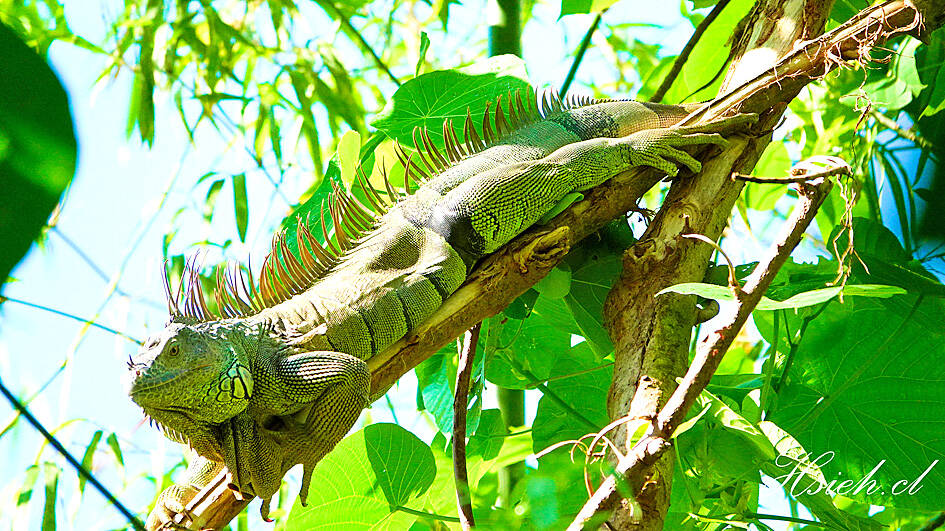Taiwan plans to cull as many as 120,000 invasive green iguanas this year to curb the species’ impact on local farmers, the Ministry of Agriculture said.
Chiu Kuo-hao (邱國皓), a section chief in the ministry’s Forestry and Nature Conservation Agency, on Sunday said that green iguanas have been recorded across southern Taiwan and as far north as Taichung.
Although there is no reliable data on the species’ total population in the country, it has been estimated to be about 200,000, he said.

Photo courtesy of Hsieh Chi-liang
Chiu said about 70,000 iguanas were culled last year, including about 45,000 in Pingtung County, 12,000 in Tainan, 9,900 in Chiayi, 6,500 in Kaohsiung, 5,000 in Changhua and about 100 in several other administrative regions.
This year, thanks to NT$20 million (US$608,606) in funding allocated by the government, the ministry has set a goal of culling 120,000, he said.
Based on its experience in eradicating the African sacred ibis, the ministry is relying mainly on professional hunting teams to cull the iguanas, which have established their presence in nine administrative regions.
About 300 people were recruited for the teams at hiring events held late last year in Tainan, Kaohsiung and Pingtung counties, while additional events would be held in Chiayi and Pingtung counties in the coming weeks, he said.
Shortly after the Lunar New Year, the ministry is also planning to release a new agricultural damage reporting app, which would include a section where farmers can post information on iguana sightings, he added.
In addition to threatening native species, iguanas are considered to be an agricultural pest and have caused widespread damage to red bean, gourd and other vegetable crops in central and southern Taiwan.
As an incentive, the ministry is offering professional hunters a bounty of NT$500 for every iguana of at least 30cm (snout to vent) they kill and NT$200 for every one shorter than 30cm.
For the general public, the bounties for iguanas are half that amount — NT$250 and NT$100, he said.
Chiu said his confidence in the iguana eradication effort drew in part from Taiwan’s success in removing African ibises, which were largely brought under control over a five-year period.
Compared with 2019, when 18,000 of the wading birds were culled, it is now estimated that only about 50 of them remain in Taiwan, he said.

Taiwanese can file complaints with the Tourism Administration to report travel agencies if their activities caused termination of a person’s citizenship, Mainland Affairs Council Minister Chiu Chui-cheng (邱垂正) said yesterday, after a podcaster highlighted a case in which a person’s citizenship was canceled for receiving a single-use Chinese passport to enter Russia. The council is aware of incidents in which people who signed up through Chinese travel agencies for tours of Russia were told they could obtain Russian visas and fast-track border clearance, Chiu told reporters on the sidelines of an event in Taipei. However, the travel agencies actually applied

New measures aimed at making Taiwan more attractive to foreign professionals came into effect this month, the National Development Council said yesterday. Among the changes, international students at Taiwanese universities would be able to work in Taiwan without a work permit in the two years after they graduate, explainer materials provided by the council said. In addition, foreign nationals who graduated from one of the world’s top 200 universities within the past five years can also apply for a two-year open work permit. Previously, those graduates would have needed to apply for a work permit using point-based criteria or have a Taiwanese company

The Shilin District Prosecutors’ Office yesterday indicted two Taiwanese and issued a wanted notice for Pete Liu (劉作虎), founder of Shenzhen-based smartphone manufacturer OnePlus Technology Co (萬普拉斯科技), for allegedly contravening the Act Governing Relations Between the People of the Taiwan Area and the Mainland Area (臺灣地區與大陸地區人民關係條例) by poaching 70 engineers in Taiwan. Liu allegedly traveled to Taiwan at the end of 2014 and met with a Taiwanese man surnamed Lin (林) to discuss establishing a mobile software research and development (R&D) team in Taiwan, prosecutors said. Without approval from the government, Lin, following Liu’s instructions, recruited more than 70 software

Taiwanese singer Jay Chou (周杰倫) plans to take to the courts of the Australian Open for the first time as a competitor in the high-stakes 1 Point Slam. The Australian Open yesterday afternoon announced the news on its official Instagram account, welcoming Chou — who celebrates his 47th birthday on Sunday — to the star-studded lineup of the tournament’s signature warm-up event. “From being the King of Mandarin Pop filling stadiums with his music to being Kato from The Green Hornet and now shifting focus to being a dedicated tennis player — welcome @jaychou to the 1 Point Slam and #AusOpen,” the